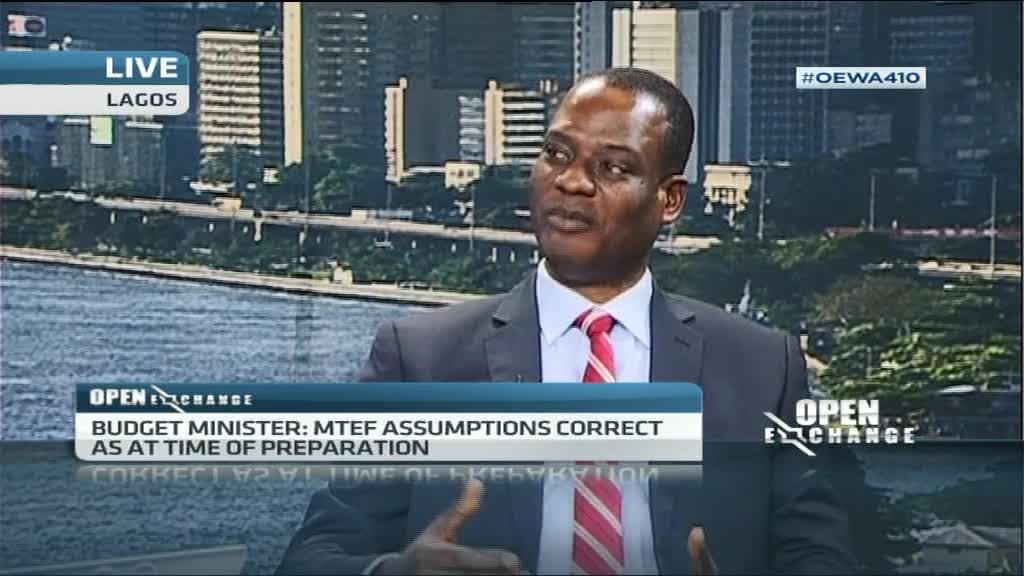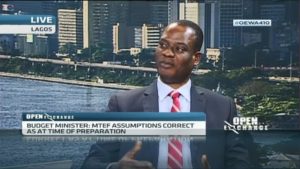Economy
2017 Tax & Fiscal Policy Prospects


By Taiwo Oyedele
Now that 2017 is here
We often have new hopes and high expectations at the turn of new events including the turn of a new year regardless of past experiences and notwithstanding our current reality.
As a country Nigeria has expectations for tax and so are individuals and organisations. To a large extent and under normal circumstances, tax should be relatively more predictable given that the rules, and administration are totally within the control of appropriate authorities. Unlike attempting to predict the weather for a whole year or other natural and supernatural events.
In any case, here are my key predictions for the tax environment in 2017 based on instinct, observable trends, behaviour of key actors in the tax system, and analysis of past patterns.
Tax Policy
There is a revised National Tax Policy awaiting government approval for implementation. It is expected that the Policy will be approved and implementation will commence but with very little traction due to vested interests and insufficient buy-in from those who need to make the required changes.
The 2017 Budget of the Federal Government of Nigeria and the 2017-2019 Medium Term Expenditure Framework have no specific proposals to increase tax rates or impose new taxes in 2017. The budget speech was silent on key tax policies but stated a commitment to align fiscal, monetary and trade policies. There are plans to revive the Export Expansion Grant scheme.
Government will focus on measures to discourage imports which suggest that import duties and waivers may be revised. Already we have seen a revision in some duty rates announced towards the end of 2016 partly designed towards the implementation of the new ECOWAS Common External Tariffs regime.
The ongoing review of tax incentives will be completed and should have a positive impact on government revenue if it addresses current abuse and plug existing leakages.
Tax Administration
Government is less bullish about non-oil revenue in 2017 compared to 2016 given the recent abysmal performance. It is expected that due to losses being reported by many companies in addition to other tax attributes such as unutilised capital allowances, the government tax take will be lower than anticipated especially from Companies Income Tax.
VAT collection is likely to improve partly due to the impact of the government social welfare scheme of conditional cash transfer and increased enforcement of compliance by FIRS but will still perform much below its potentials.
The aggressive stance by government at all levels will continue and intensify. In addition to imposition of stiff penalty and interest there is likely to be criminal prosecutions. Guidelines from the FIRS will continue to be hazy and request for rulings and direction by taxpayers may not receive prompt attention.
Internally generated revenue drive will continue to be on the front burner but still only an insignificant progress will be made due to the haphazard approach and the prevailing harsh economic condition.
It is counter-intuitive that many politicians play politics with revenue generation by placing political considerations ahead of professionalism. Unfortunately many lawmakers, administrators and policymakers lack proper understanding of the tax system. This coupled with undue political interference and vested interests mean that tax revenue will continue to be disappointingly low.
The FCT Internal Revenue Service will make some progress towards the full implementation of its mandate. Adoption and implementation of e-tax systems by various tax authorities will continue to be slow and ineffective.
More stakeholders will trigger the necessary provisions of the Freedom of Information Act to request for relevant information on tax administration, spending and expenditure control.
Some of the initiatives by the FIRS such as joint audit and use of consultants will continue to face implementation hurdles and unlikely to yield any major results. A number of tax authorities will introduce tax amnesty in order to expand the tax net and encourage voluntary compliance.
Tax Regulation
There will be some progress with the restructured Petroleum Industry Bill (PIB) with a high possibility for the governance framework being passed into law but other aspects of the Bill which are more controversial including the fiscal regime, derivation formula and host community issues will remain unresolved.
The proposed 9% Communication Service Tax will not see the light of day in its current form due to public resistance, bad timing which may be considered as insensitive and poor articulation of the justifications for the tax.
There will be some efforts to begin a comprehensive tax law review in 2017. The attempt to broaden the scope of stamp duty to cover savings account deposits, among others, will not yield any positive result as well as the plan to charge VAT on international passports.
Nigeria will sign more tax treaties for the avoidance of double taxation but ratification at the National Assembly necessary to domesticate the treaties will continue to be slow.
Tax Justice
The Tax Appeal Tribunal will be reconstituted. The aggressive level of tax audits by tax authorities especially the progress being made by the FIRS regarding transfer pricing reviews will lead to more disputes and hence a rise in tax appeal cases.
More tax disputes will be resolved in favour of taxpayers due to untenable positions taken by the tax authorities. The judiciary will generally continue to struggle with proper and timely dispensation of tax cases due to lack of in-depth tax knowledge especially in more complex situations and evolving areas.
The Global Tax Space
The OECD’s Base Erosion and Profit Shifting (BEPS) action plan will continue to be a major area of focus for tax authorities around the world. Many countries will enact new laws or amend existing ones to provide a legal framework for its implementation. However, there will be very little progress in Africa including Nigeria as many countries will be unable to make the necessary legal changes. Many more countries will subscribe to the Common Reporting Standards and join the multilateral treaties for collaboration, and exchange of information but implementation will be sketchy.
There will be some tax leaks but not at the same level and magnitude of the 2016 Panama Papers. The scrutiny of tax havens will increase and tax ‘sweetheart deals’ will be challenged both legally but more importantly from a morality standpoint.
The new ECOWAS Common External Tariff scheme will continue to experience poor implementation by member countries thereby undermining the regional integration efforts.
2017 Tax Resolutions
Just in case you do not have any New Year resolutions for tax, you need to commit to paying your taxes correctly and on time. Tax will not just be a compliance matter but a business continuity and sustainability issue. More importantly, as a taxpayer you must hold government accountable for the taxes paid. This will create more tax awareness and citizen engagement.
Overall, the tax journey in 2017 will be bumpy but I am cautiously optimistic that it will end in safe landing albeit with some bruises.
Economy
Crude Oil Falls as Geopolitical Risk Around Iran Clouds Supply Outlook

By Adedapo Adesanya
Crude oil settled lower on Thursday as investors tracked developments in talks between the United States and Iran over the latter’s nuclear programme, weighing potential supply concerns if hostilities escalate.
Brent crude futures lost 10 cents or 0.14 per cent to close at $70.75 a barrel, while the US West Texas Intermediate (WTI) crude futures depreciated by 21 cents or 0.32 per cent to $65.21 a barrel.
The US and Iran held indirect talks in Geneva on Thursday over their long-running nuclear dispute to avert a conflict after US President Donald Trump ordered a military build-up in the region.
Prices had gained earlier in the session after media reports indicated the talks had stalled over US insistence on zero enrichment of uranium by Iran, as well as a demand for the delivery of all 60 per cent-enriched uranium to the US.
However, prices then retreated after the two countries extended talks into next week, reducing the immediate strike potential.
Iran’s Foreign Minister, who confirmed talks will continue next week, said Thursday’s talks were the most serious exchanges with the US yet, saying Iran clearly laid out its demand for lifting sanctions and the process for relief.
His counterpart from Oman, who is handling the talks, said significant progress was made in Thursday’s talks. The Omani minister’s upbeat assessment followed indirect talks between Iranian Foreign Minister and US envoys Steve Witkoff and Jared Kushner in Geneva, with one session in the morning and the second in the afternoon.
He will also hold talks with US Vice President JD Vance and other US officials in Washington on Friday.
The Trump administration has insisted that Iran’s ballistic missile program and its support for armed groups in the region must be part of the negotiations.
The American President said on February 19 that Iran must make a deal in 10 to 15 days, warning that “really bad things” would otherwise happen.
On Tuesday, he briefly laid out his case for a possible attack on Iran in his State of the Union speech, underlining that while he preferred a diplomatic solution, he would not allow Iran to obtain a nuclear weapon.
Meanwhile, the US continues to amass forces in the Middle Eastern region, with the military saying it is prepared to execute orders given by the US President.
Economy
Why Transparency Matters in Your Choice of a Financial Broker

Choosing a Forex broker is essentially picking a partner to hold the wallet. In 2026, the market is flooded with flashy ads promising massive leverage and “zero fees,” but most of that is just noise. Real transparency is becoming a rare commodity. It isn’t just a corporate buzzword; it’s the only way a trader can be sure they aren’t playing against a stacked deck. If a broker’s operations are a black box, the trader is flying blind, which is a guaranteed way to blow an account.
The Scam of “Zero Commissions”
The first place transparency falls apart is in the pricing. Many brokers scream about “zero commissions” to get people through the door, but they aren’t running a charity. If they aren’t charging a flat fee, they are almost certainly hiding their profit in bloated spreads or “slippage.” A trader might hit buy at one price and get filled at a significantly worse one without any explanation. This acts as a silent tax on every trade. A transparent broker doesn’t hide the bill; they provide a live, auditable breakdown of costs so the trader can actually calculate their edge.
The Conflict of Market Making
It is vital to know who is on the other side of the screen. Many brokers act as “Market Makers,” which is a polite way of saying they win when the trader loses. This creates a massive conflict of interest. There is little incentive for a broker to provide fast execution if a client’s profit hurts their own bottom line. A broker with nothing to hide is open about using an ECN or STP model, simply passing orders to the big banks and taking a small, visible fee. If a broker refuses to disclose their execution model, they are likely betting against their own clients.
Regulation as a Safety Net
Transparency is worthless without an actual watchdog. A broker that values its reputation leads with its licenses from heavy-hitters like the FCA or ASIC. They don’t bury their regulatory status in the fine print or hide behind “offshore” jurisdictions with zero oversight. More importantly, they provide proof that client funds are kept in segregated accounts. This ensures that if the broker goes bust, the money doesn’t go to their creditors—it stays with the trader. Without this level of openness, capital is essentially unprotected.
The Withdrawal Litmus Test
The ultimate test of a broker’s transparency is how they handle the exit. There are countless horror stories of traders growing an account only to find that “technical errors” or vague “bonus terms” prevent them from withdrawing their money. A legitimate broker has clear, public rules for getting funds out and doesn’t hide behind a wall of unreturned emails. If a platform makes it difficult to see the exit strategy, it’s a sign that the front door should have stayed closed.
Conclusion
In 2026, honesty is the most valuable feature a broker can offer. It is the foundation that allows a trader to focus on the charts instead of worrying if their stops are being hunted. Finding a partner with clear pricing, honest execution, and real regulation is the first trade that has to be won. Flashy marketing is easy to find, but transparency is what actually keeps a trader in the game for the long haul.
Economy
Nigeria’s Stock Market Indices Shrink 0.41% Amid Panic Sell-Offs

By Dipo Olowookere
The Nigerian Exchange (NGX) Limited came under panic sell-offs on Thursday, as the investing community awaits the outcome of a probe into trading activities around one of the stocks on the bourse.
On Monday, trading in Zichis equities was prohibited by the regulator after it gained almost 900 per cent in one month of being listed by introduction on the growth board of the exchange.
This action triggered cautious trading on Customs Street, and things have not remained the same since then.
Yesterday, the key performance indices of the Nigerian bourse further depreciated by 0.41 per cent, the third straight loss this week, as investors book profit before being trapped.
It was observed that the energy industry gained 0.12 per cent and was the only one in green, as the industrial goods space shed 1.19 per cent, the banking counter depreciated by 0.63 per cent, the insurance sector lost 0.32 per cent, and the consumer goods segment tumbled by 0.03 per cent.
As a result, the All-Share Index (ASI) contracted by 802.39 points to 193,567.81 points from 194,370.20 points, and the market capitalisation decreased by N515 billion to N124.239 trillion from N124.754 trillion.
During the session, investors traded 868.5 million shares worth N31.5 billion in 69,310 deals compared with the 1.4 billion shares valued at N46.2 billion exchanged in 70,222 deals at midweek, showing a drop in the trading volume, value, and number of deals by 37.96 per cent, 31.82 per cent, and 1.30 per cent, respectively.
Jaiz Bank led the activity chart with 78.9 million equities valued at N1.2 billion, Japaul traded 73.3 million stocks worth N274.8 million, Access Holdings exchanged 66.9 million shares for N1.7 billion, Chams sold 56.9 million equities worth N239.6 million, and Zenith Bank transacted 45.5 million stocks valued at N4.1 billion.
The worst-performing stock for the day was Jaiz Bank after it lost 9.98 per cent to trade at N12.63, Ikeja Hotel declined by 9.90 per cent to N37.75, John Holt shrank by 9.90 per cent to N8.65, Enamelware slipped by 9.88 per cent to N36.50, and Cadbury went down by 9.69 per cent to N61.95.
On the flip side, FTN Cocoa was the best-performing stock after it gained 10.00 per cent to sell for N6.05, RT Briscoe improved by 9.95 per cent to N11.38, Deap Capital soared 9.92 per cent to N6.98, Japaul grew by 9.91 per cent to N3.77, and Ellah Lakes surged 9.72 per cent to N11.85.
Investor sentiment remained bearish as the exchange finished with 30 price gainers and 38 price losers, implying a negative market breadth index.
-

 Feature/OPED6 years ago
Feature/OPED6 years agoDavos was Different this year
-
Travel/Tourism10 years ago
Lagos Seals Western Lodge Hotel In Ikorodu
-

 Showbiz3 years ago
Showbiz3 years agoEstranged Lover Releases Videos of Empress Njamah Bathing
-

 Banking8 years ago
Banking8 years agoSort Codes of GTBank Branches in Nigeria
-

 Economy3 years ago
Economy3 years agoSubsidy Removal: CNG at N130 Per Litre Cheaper Than Petrol—IPMAN
-

 Banking3 years ago
Banking3 years agoSort Codes of UBA Branches in Nigeria
-

 Banking3 years ago
Banking3 years agoFirst Bank Announces Planned Downtime
-

 Sports3 years ago
Sports3 years agoHighest Paid Nigerian Footballer – How Much Do Nigerian Footballers Earn






















